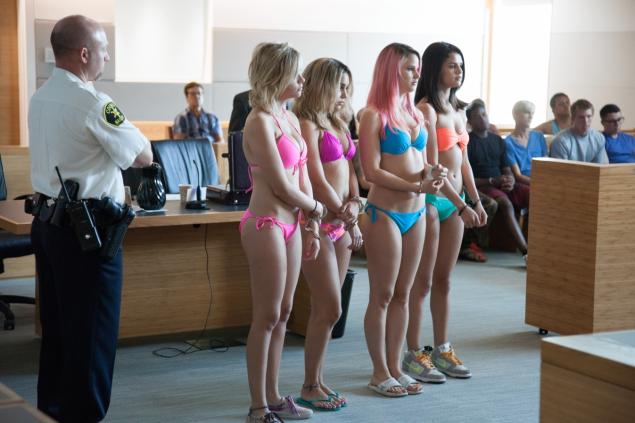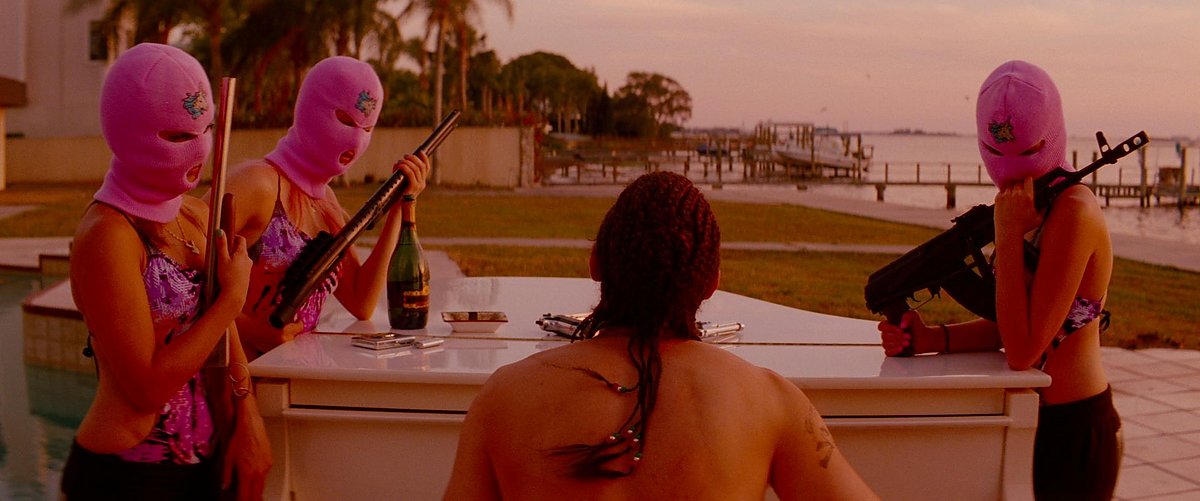|
In
1995 Harmony Korine wrote the screenplay for the Larry Clark film Kids, an unflinching drama about kids
engaging in underage sex and drug use. Two years later, Korine made his
directional debut with the bleak, apocalyptic Gummo, which
charted more absurdist waters in a post-apocalyptic
world of boredom and young people running amok. Troubled youths is a
reoccurring
theme that has stayed with this former skateboarder right up till now.
Spring Breakers is a more accessible and
commercial film than Gummo but its
short of a narrative and it lacks the matter-of-fact treatment of Kids. There's a memorable visual style
and a bizarre, entertaining performance by James Franco, but not enough
story
or insight to certify its importance. The film is long and flabby, its
characters and plot underdeveloped and Korine's direction lacks
certainty. Is
this a critique of a self-absorbed generation, a comedy, a thriller or
just an
exercise in perversion?

The
film is about four bored college girls named Faith (Selena Gomez),
Candy
(Vanessa Hudgens), Brit (Ashley Benson) and Cotty (Rachel Korine), who
want to
party during spring break. When they can't pool enough money together
for the
trip, they decide to rob a diner. They reach the spring break
destination, only
to be arrested by the police and then bailed out by a man calling
himself Alien
(James Franco). He is a drug dealer that encourages them to join him on
a crime
spree and wipe out a nearby rival gangster.
In an
interview with the Australian movie magazine FilmInk, Korine discussed
his
intentions for the film: "I make movies because I like the story and
the
characters. I'm not making a movie that's an indictment on American
culture, or
a movie that's about boobs or guns - those are parts of
that world and that fabric, but it's not about that."
As Korine suggests,
the film's point becomes extremely elusive, particularly when the
filmic style
is separated from the theme, and his direction relies on technique to
substitute plotting.

The early
scenes work to instill feelings of belonging. The long shots of the
still,
tired, grey and empty college grounds reflects the girls' isolation
because they
fear they won't experience anything new or meet anyone exciting as
everyone has
already left for spring break without them. These shots are juxtaposed
by the party
scenes, which are filmed through the extensive use of montage,
with music playing over slow-motion and highly saturated images.
It provides
these ugly scenes of drinking, drugs and senseless nudity as a
dream-like
vision of paradise in the minds of these morally corrupted girls.
"Pretend
it's a video game...act like you're in a movie," one of the girls says
to
further highlight their detachment from reality. The night scenes
reflect
darkness in mood and lighting but also moral decay, with only the
fluorescent colours
of the girls' costumes brightening the screen to suggest their belief
in their
own self-importance, while the broader landscape of society fades into
the shadows.

However,
the film's voyeuristic disposition reveals Korine's apathy towards
character
development and narrative thrust. Korine's costume choice of leaving
the girls
in their swimsuits for most of the film, and the way that his camera
lingers
over those raunchy party scenes, evokes an unintentionally creepy sense
of
perversion. Apart from the opening scenes, the elaborate neon visuals
eclipse
the story and characters, with the repetitive vision of raunchy
partying making
the film seem excruciatingly long and banal.
Selena
Gomez is the only standout of the girls, proving that she can act by
showing some
believable emotion. However, the religious symbolism of her character
barely
registers as one-dimensional and the other three girls, despite their
intimidation factor, are underwritten and lack distinction. James
Franco provides
the most memorable role of his career as Alien, a cross between a
hip-hop
rapper and the Devil, who has a cornrows haircut, gold teeth and
dresses like a
gangster.

He's utterly
mesmerising and funny, but what exactly does his character want? He
uses the
girls for crime jobs but never really needed to as he has his twin
henchmen.
Sex is an option he fulfils, but not straight away either. A promising
seed of
conflict is planted when the girls look as though they'll rob or kill
Alien,
only for the moment to fizzle out. He embodies a bastardised version of
the
American Dream: to take everything you want, while you can, but not
understand
what to do with it. In a very funny scene, he showcases all of the
useless
things he was able to obtain, including several kinds of shorts, a
looping copy
of Scarface, and nunchucks.
Alien's
artlessness is amplified strikingly through the film's best and
strangest
scene, where he sits at a piano, surrounded by the girls dressed in
pink
balaclavas, carrying assault weapons, and declares Britney Spears as
one of the
best singers of all time. He starts singing Britney's song "Everytime"
and then a montage opens with the song playing over images of the
girls' crime
spree. Decadence is visualised magnificently but in the end the film is
hypocritical: a hasty attack on a pop generation when the film itself
is not
art but poorly disciplined and morally questionable.
|